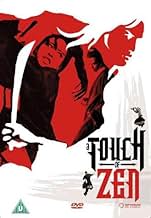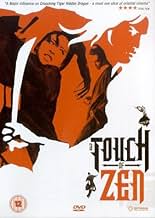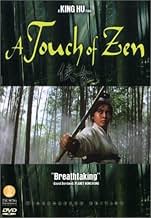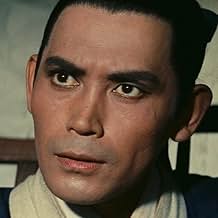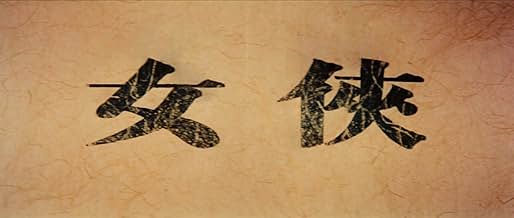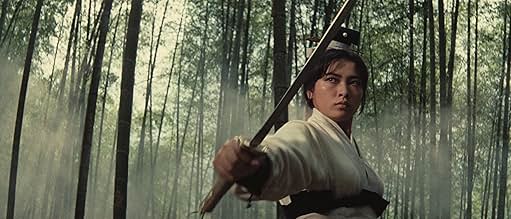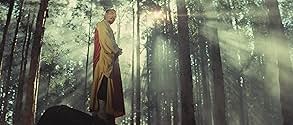A lady fugitive on the run from corrupt government officials is joined in her endeavors by an unambitious painter and skilled Buddhist monks.A lady fugitive on the run from corrupt government officials is joined in her endeavors by an unambitious painter and skilled Buddhist monks.A lady fugitive on the run from corrupt government officials is joined in her endeavors by an unambitious painter and skilled Buddhist monks.
- Awards
- 2 wins & 1 nomination total
- Director
- Writers
- All cast & crew
- Production, box office & more at IMDbPro
Featured reviews
Critics of Occidental country always ignore the genre movie. It is why by exemple, we never saw "Ninkyo Eiga" from Japan, but it is the moste populare genre in the 60-70 era. When a director like Sergio Leone made too much succes, they can't ignore him. But in general, they try to put their own idea of the each country's cinematography on the dictionnary. Japan are a zen country who made slow movie like Ozu (althought Ozu try to made movie like American with Japanese things).
This is why the history of cinema are full of injustice. King Hu are one the great injustice. Yes, he made wu xia pian, a martial art genre movies. Swordplay movie in fact.
But is movies are a perfect mechanic, an exemple of editing. Hu made is own editing and like the piano play by Glenn Gould, we recognise his style when you pay attention of editing.
Hu dont want to use "wire" or special effect. He want use "editing" and camera to suggest anythings.
A Touch Of Zen are a gem. But i understand, it is maybe too much asian for the american country. All the first alf of the movie are talk and slow pacing. But the others alf are action, action and action. I dont know who want to watch that. Intellectual who love serious movies will love the first alf but maybe they just think acyion are too stupide. Same thing for the teenager who love action pack.
But, if you forget all your expectation, you will be touch byééé magic of poetry. Hu made a 3 distinctive parts movie. The first focus on individuality, the second on politics and the third on religion.
The first hour focuys on a naive scholar who discover strange yhing happen in the village where he live whit his old mothers. Suspens and mystery are the substance of this part.
The second show politics manipulation and the substance of war. This is the Hu tradionnal part. We are in Dragon Inn Gate, Fate Of Lee Khan or all the politics corruption things. A lot of martial arts.
The third part introduce us in the things of spirit. Hu show us a personn face to himself, the society and the spiritual....
But dont epect the spiritual journey like American movies. It his a King Hu movie. Ellipse and short cut are always where you dont expect and the focus always where you never goes....
A great movie.
The film is carefully structured, in three contrasting sections. It is only when you look back that you realize just how cleverly King Hu has created those three sections. The same characters, for the most part, appear in each section, but each focuses on a different combination. The first section focuses on the artist Ku, slowly building a picture of a quiet life in a rural backwater. The second switches tempo, with amazing martial arts action focusing on the fugitive Ku and her friends. The final section calms down again, as the mysterious Buddhist monk comes into sharp focus, and the martial arts become more and more amazing.
All this takes place in the most beautiful Chinese countryside, sometimes bathed in light (the use of sunlight and the monk is particularly impressive) and sometimes in dramatic thunderstorms, making the film even more of a delight to watch. Don't be put off by the 'kung-fu' label, this is even better than "Crouching Dragon, Hidden Tiger".
It is over three hours long; the first hour is mainly scene-setting and not much happens, but this just adds to the impact. All you could want in a film is here - tension, action, arty filmwork, a kind of love interest, action, beautifully choreographed fights, intrigue, action, comedy, philosophy.... and a monk who is so pure that when he is wounded he bleeds.... well, you'd better see for yourself what he bleeds.
A must-see (if you have three hours to spare).
Aside from the philosophical points, ZEN also scores strongly in establishing mood, suspense, and fascinating visuals. The Jiang Hu in this film feels incredibly authentic, and the rich mise-en-scene is refreshing compared to the limited Shaw Bros studio offerings. I loved the photography throughout; it beautifully captures the spiritual wonder of ancient Orient. In framing still shots, King Hu chiefly employs medium and medium close-ups, mounting his camera at an upward angle so we can always see beyond the characters, perhaps to suggest existence of higher wisdom.
One observation I would like to propose is that although ZEN is probably a milestone in Chinese cinema, it would be a minor masterpiece compared to the best works from 60s Japan. The lush photography and haunting images from KWAIDAN come to mind as a comparison. No doubt, King Hu also learned a few tricks from the likes of Kurosawa, such as pointing his camera at the sun which occurs frequently in ZEN.
[9/10]
Did you know
- TriviaDirector King Hu had a full village constructed for the opening half of the movie, and then left it alone for nine months to give it a weathered look.
- GoofsThe film is set in the 14th century AD. However, the Gu family have maize (corn) drying outside their house - this crop is American in origin and did not reach China until the 16th century.
- Quotes
Ku Shen Chai: Have you seen Miss Yang, the lady who lives here?
General Shih Wen-chiao: No, I'm blind.
Ku Shen Chai: Forgive me.
General Shih Wen-chiao: Miss Yang and her mother are gone.
Ku Shen Chai: Mr. Shih! She said you should run for your life too. Do you know where she went?
Ku Shen Chai: I have to find her!
[Shih pulls out a sword as two soldiers fly down from the sky and attack, but are quickly killed in a few brief strokes of the sword]
Ku Shen Chai: Mr. Shih! Mr. Shih, who are you really?
General Shih Wen-chiao: I'm not blind, that's for sure.
- Alternate versionsA Touch Of Zen was originally released in Taiwan in two parts with a total running time of 3 hours 20 minutes. However, the bamboo forest sequence which ended part one was reprised at the beginning of part two, adding over 20 minutes to the total running time. When the two parts were combined by King Hu without any repeated scenes in 1975, the resulting total time was 3 hours. The 2015 4K restoration from the original negative runs 2 hours 59 minutes.
- ConnectionsFeatured in La menace (1977)
- How long is A Touch of Zen?Powered by Alexa
Details
- Release date
- Countries of origin
- Language
- Also known as
- Les héroïques
- Filming locations
- Taroko National Park, Hualien, Taiwan(monastery and river canyon)
- Production companies
- See more company credits at IMDbPro
- Runtime3 hours 20 minutes
- Sound mix
- Aspect ratio
- 2.35 : 1
Contribute to this page



